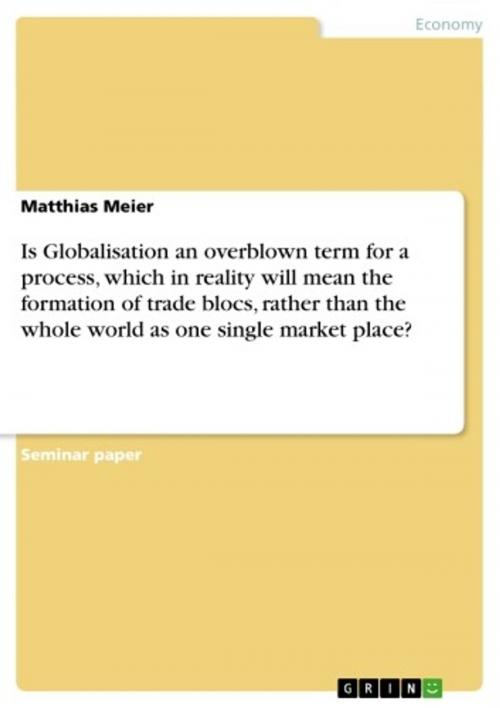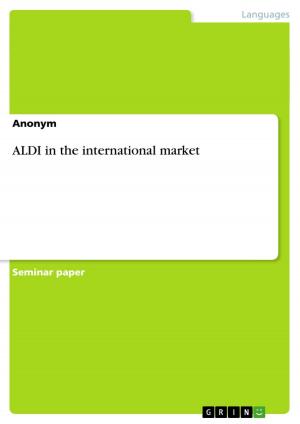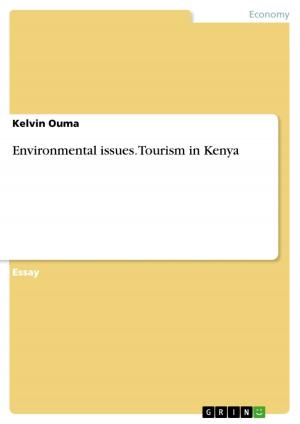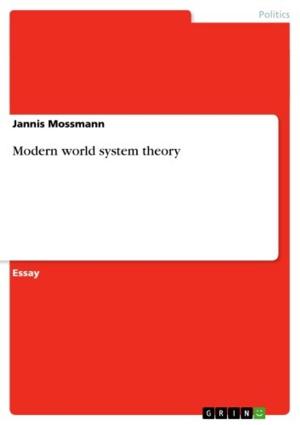Is Globalisation an overblown term for a process, which in reality will mean the formation of trade blocs, rather than the whole world as one single market place?
Nonfiction, Social & Cultural Studies, Political Science, Politics, Economic Policy| Author: | Matthias Meier | ISBN: | 9783638829861 |
| Publisher: | GRIN Publishing | Publication: | July 19, 2007 |
| Imprint: | GRIN Publishing | Language: | English |
| Author: | Matthias Meier |
| ISBN: | 9783638829861 |
| Publisher: | GRIN Publishing |
| Publication: | July 19, 2007 |
| Imprint: | GRIN Publishing |
| Language: | English |
Seminar paper from the year 2006 in the subject Business economics - Economic Policy, grade: 1,7, University of Westminster (University of Westminster), course: Modern Business Cultures in the Age of Globalisation, 15 entries in the bibliography, language: English, abstract: Today everybody talks about globalisation and while some people are looking forward to a globalised and fully integrated world some critics argue that this process leads to a world where the rich become richer and the poor even become poorer. But does globalisation really take place? More and more nations engage in a process called regionalisation. Regional agreements have never been so popular as today and the number of trade blocs increases. Today approximately 170 regional agreements exist and half of them have been established since 1990 (Moore, 2000). Most of the WTO members are at least part in one of them and 50% of worldwide trade occurs between countries belonging to regional agreements (Ruggiero, 2003). Even the WTO as an institution with the objective to foster world trade and to abolish measures that inhibit trade, is increasingly concerned about regionalisation and the growing number of trade blocs which have the potential to circumvent and undermine the aim of the WTO by offering privileges to its members and discriminating non-members (Au and Chan, n.d.). Mike Moore (2000), former WTO Director General puts it as follows: 'Is there a risk that regionalism is becoming a stumbling-block, more than a building block, for the new WTO? Draining energy from multilateral negotiations? Fragmenting international trade? And creating a new international disorder characterized by growing rivalries and marginalization and the possibility of hostile blocs?' (Moore, 2000). Hirst and Thompson (1996) argue that globalisation is an overblown term for a process which in reality will mean the formation of trade blocs, rather than the whole world as one single market place. This essay critically evaluates this argument by considering the pros and cons of the question whether trade blocs replace the concept of globalisation and the world as one single market place. This question will be answered with the help of bifocal perspectives. The second Chapter considers a micro-perspective by evaluating whether companies become increasingly footloose and transnational or whether companies retain a home base with significant sales in their home region or trade bloc. The third Chapter has a more general perspective and assesses the importance of trade blocs and its impact on inter- and intra-trade.
Seminar paper from the year 2006 in the subject Business economics - Economic Policy, grade: 1,7, University of Westminster (University of Westminster), course: Modern Business Cultures in the Age of Globalisation, 15 entries in the bibliography, language: English, abstract: Today everybody talks about globalisation and while some people are looking forward to a globalised and fully integrated world some critics argue that this process leads to a world where the rich become richer and the poor even become poorer. But does globalisation really take place? More and more nations engage in a process called regionalisation. Regional agreements have never been so popular as today and the number of trade blocs increases. Today approximately 170 regional agreements exist and half of them have been established since 1990 (Moore, 2000). Most of the WTO members are at least part in one of them and 50% of worldwide trade occurs between countries belonging to regional agreements (Ruggiero, 2003). Even the WTO as an institution with the objective to foster world trade and to abolish measures that inhibit trade, is increasingly concerned about regionalisation and the growing number of trade blocs which have the potential to circumvent and undermine the aim of the WTO by offering privileges to its members and discriminating non-members (Au and Chan, n.d.). Mike Moore (2000), former WTO Director General puts it as follows: 'Is there a risk that regionalism is becoming a stumbling-block, more than a building block, for the new WTO? Draining energy from multilateral negotiations? Fragmenting international trade? And creating a new international disorder characterized by growing rivalries and marginalization and the possibility of hostile blocs?' (Moore, 2000). Hirst and Thompson (1996) argue that globalisation is an overblown term for a process which in reality will mean the formation of trade blocs, rather than the whole world as one single market place. This essay critically evaluates this argument by considering the pros and cons of the question whether trade blocs replace the concept of globalisation and the world as one single market place. This question will be answered with the help of bifocal perspectives. The second Chapter considers a micro-perspective by evaluating whether companies become increasingly footloose and transnational or whether companies retain a home base with significant sales in their home region or trade bloc. The third Chapter has a more general perspective and assesses the importance of trade blocs and its impact on inter- and intra-trade.















